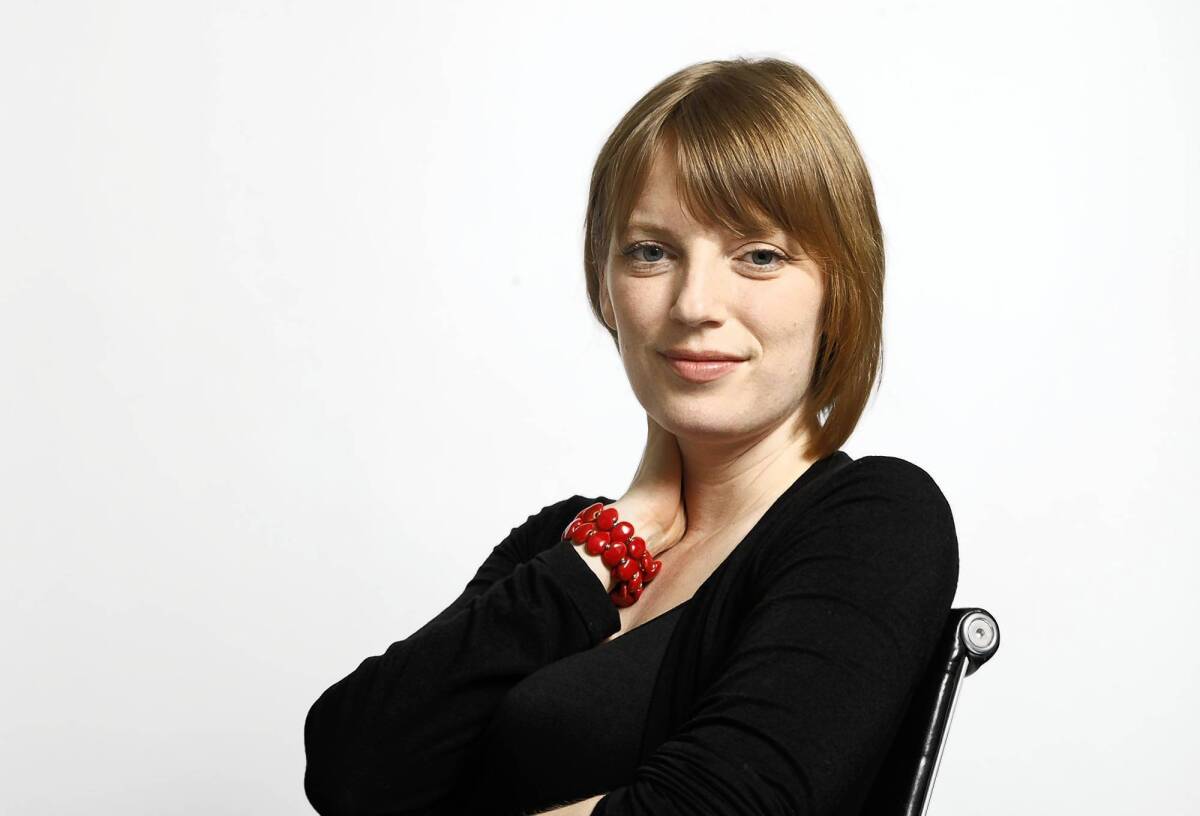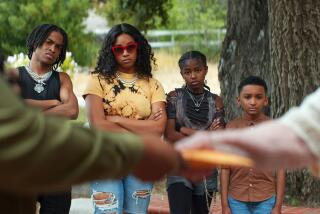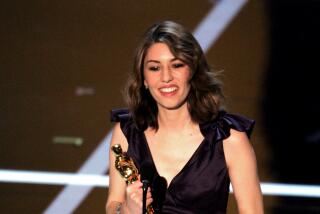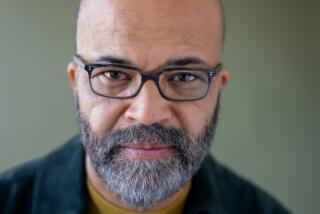Sarah Polley explores her uprooted, twisted family tree

Two days after her 11th birthday, Sarah Polley lost her mother to cancer. The death came as a shock, even though her father and older siblings had watched Diane Polley battle the disease for months. As she grew up in Toronto under the care of her father, Michael, Polley’s conception of her mother was fuzzily constructed from memories, photographs and family stories.
Nevertheless, she followed her mother’s footsteps into acting, taking to the Canadian stage as a child and at 18 catching the attention of U.S. audiences after her role in “The Sweet Hereafter.”
A decade later, hours before she was to introduce a Montreal screening of “Away From Her” — her first film as a director and one that would land her an Oscar nomination — a secret that had been buried all of her 28 years suddenly burst into the open: Michael Polley was not her biological father.
PHOTOS: Hollywood backlot moments
The revelation sent Polley reeling: If her father was not her father, then who was her mother, and what did that mean about her own identity?
In a new, extremely intimate documentary five years in the making, Polley searches for her own answers while posing universal and sometimes uncomfortable questions about betrayal, identity and the definition of family. Manipulating even as it exposes, “Stories We Tell” is a provocative, genre-bending documentary that examines how we construct personal narratives and shows Polley struggling with her own.
Shocking news
The revelation of Polley’s true parentage landed her in bed for two weeks, ill with a long fever. “My body went into shock and sickness, and every time I’ve gone to Montreal since then, I get really sick,” she said. “I think it’s a lot to absorb and kinda difficult.”
The news also sent ripples through her extended family, with the story being told and examined from multiple points of view by her four older brothers and sisters, her uncle, her mother’s friends and others. Like an elaborate game of telephone, everyone had a slightly different take upon learning the identity of Sarah’s biological father.
Michael Polley was jolted into restarting a long-dormant writing career, penning nearly 80 pages of copy with details of the story from his perspective. Sarah Polley’s biological father also took to the computer, creating his own narrative of the events that eventually led him to reveal his identity to her in Montreal.
Polley and her siblings found the story becoming the focus of many a dinner party, with each of them highlighting a different aspect of the tale as it related to their own history. The filmmaker realized this was something worthy of more detailed exploration — and a documentary was born.
“I wasn’t interested in exposing myself,” said Polley, 34, whose diminutive stature belies a striking ambition. “What got me interested was my father’s unusual and unexpected response to the news. And my biological father was also writing about it. There were all these weird discrepancies in the stories, and we were also all so invested in telling it. It was really interesting to have a big drama in your own life, and have this need to make it into narrative.”
For the next five years, Polley dived deep into her family history, weaving footage from home Super 8 movies and old photographs with confessional interviews from brothers John Buchan and Mark Polley, sisters Susy Buchan and Joanna Polley, plus Michael Polley and her biological father, among others. She also peels back the filmmaking process, filming set-up shots and voice-over sessions while obfuscating other details, particularly her personal response to the shocking revelation.
Critics have responded to “Stories We Tell” as a significant step in Polley’s evolution as a filmmaker. Early reviews out of last year’s Telluride and Toronto film festivals were glowing. Indiewire called it “the finest of Polley’s filmmaking skills” while New York Magazine’s David Edelstein referred to Polley as a “gifted actress and possibly more gifted writer-director.”
Director Atom Egoyan, who cast Polley in “The Sweet Hereafter” and has remained close to the actress, said he was astounded by her progress as a director.
“When I saw ‘Away From Her,’ I thought, ‘Well, this isn’t a surprise that someone who’s such a great actor would be able to create such amazing performances and have such a rapport with her cast,’” Egoyan said, referring to Polley’s directorial debut, which centered on the deterioration of a couple in the face of Alzheimer’s and landed actress Julie Christie an Oscar nomination for lead actress.
“But this film is a shock because it’s such a sophisticated piece of filmmaking,” he added, “both in terms of the ambition and the success with which it’s able to deploy this very original idea. It’s completely unlike any other film I’ve seen.”
Reliving the pain
Despite Polley’s comfort in front of the camera, turning her lens inward was no easy feat.
“I think to make it your job to think about your family and to dredge up stuff about your family all day, every day would make anybody totally crazy. It makes you nuts,” said Polley, who said she would be content never to see the movie again. “There was an intense claustrophobia involved, and I often felt like, ‘OK, I’ve processed this stuff personally, so what the hell am I doing continuing to make this film about this topic and having to go into it every day?’”
PHOTOS: Celebrity portraits by The Times
Polley cornered each of her four siblings for multiple daylong interviews, asking each to recount the story of their mother’s life. Michael Polley and Sarah’s biological father also speak at length on camera, each discussing the woman they loved, their relationship with her and even their feelings about the “other man.” The interviews are remarkably candid, with the main players expressing a wide range of emotions: regret, empathy and self-criticism.
John Buchan, one of two children from Diane Polley’s first marriage and a casting director for films, was a key participant, consulting on the movie and providing crucial pieces of information about the crux of the family secret. Like his siblings, he felt skeptical that anyone outside the family would care about the story, but he was also energized by the experience.
“I’ve never sat down and spoken on camera about personal stuff, so I was nervous and it was tiring and probably therapeutic in some ways,” he said. “I can’t compare Sarah as an interviewer to anyone — except, I guess, my therapist — and, thank God those sessions aren’t captured on film.... Yet the pressure was on because I wanted to get it all right and authentic for Sarah and the story that was unfolding for her.”
Polley, who became a mother herself during the making of this familial drama, found herself needing breaks during the long process, at one point leaving “Stories We Tell” for seven months to write and direct “Take This Waltz,” a narrative feature starring Michelle Williams and Seth Rogen released in the U.S. last year.
The long slog gave Polley the chance to fill in many blanks about her mysterious matriarch. She closely examined the details of Diane Polley’s life, from a career perspective and her tumultuous private life. One section of the film recounts how Diane left her first husband for Michael and in the process lost custody of John and Susy; she made headlines as the first Canadian woman to be denied custody because of her adulterous affair. That experience gravely affected her children — and serves as something of an explanation as to why she did not leave Michael for Sarah’s father.
Along the way Polley discovered new footage of her mother, including an audition tape of her singing “Ain’t Misbehavin’.” The stark, black and white close-up shot captured Diane Polley in a vulnerable state trying out for a project she desperately wanted to land.
“I had known this story my whole life about this part she wanted and she didn’t get and she thought of it as a pivotal moment in her life, and it really broke her heart,” said Polley. “I always knew that story, but I didn’t know there was footage of it. When I found it, I thought, ‘Oh, my God, I get to watch this, watch her face. It was heartbreaking.’”
Anxious times
As the process of making “Stories We Tell” dragged on for years, Polley weathered ups and downs in her relationships with Michael Polley, her biological father and in her own marriage. (Polley divorced her first husband in 2008 and remarried in 2011. During the making of the film, her sisters also divorced their spouses.) On the upside, the experience afforded her the opportunity to more intimately understand her mother.
“I did get to spend so much time with everybody my mom was close to and ask them for hours uninterrupted about what she was like,” she said. “Most people who lose a parent don’t get that opportunity — that was an amazing experience to get to know her better.”
Even so, Polley said she was beset by self-doubt, constantly questioning what she felt was an irrational need to make the movie. The only thing that somewhat assuaged that anxiety was the support of the National Film Board of Canada, which financed the $1.7-million film. Polley credits the organization with pushing her to persevere when she was ready to abandon the project.
“I don’t think the self-doubt ever went away until the film was out in the world and people didn’t laugh at it and make fun of me. That was such a relief,” said Polley, whose next project is adapting Margaret Atwood’s “Alias Grace.” “This was something that compelled me. I didn’t want to do it. I knew better not to do it and yet I kept doing it. I don’t think I ever resolved my self-doubt or my feelings of ambiguity about it. But at a certain point, a certain amount of money has been spent and you can’t go back anymore.”
More to Read
Only good movies
Get the Indie Focus newsletter, Mark Olsen's weekly guide to the world of cinema.
You may occasionally receive promotional content from the Los Angeles Times.






